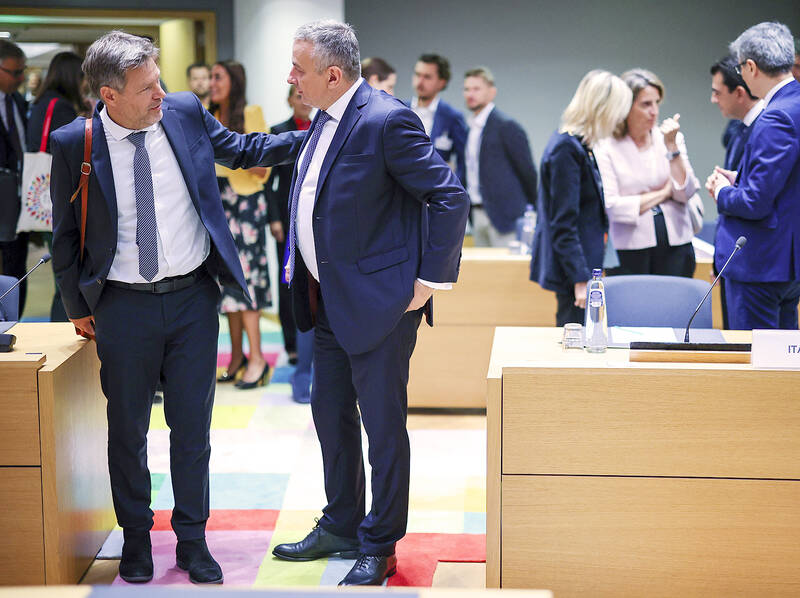EU energy ministers met on Friday to seek agreement on ways to shield citizens from sky-high energy prices and prevent power utilities from collapsing as Russia gradually turns off gas supplies to Europe in the standoff over Ukraine.
EU diplomats said that member states broadly back proposals to help power providers from being crushed by a liquidity crunch, but are divided about plans to cap Russian gas prices.
Russia, which supplied Europe with a third of its gas supplies until its invasion of Ukraine, has said it would turn off supplies completely if a cap is imposed.

Photo: AP
Friday’s ministerial talks aim to whittle down options to those with broad support before presenting formal proposals, rather than reaching a final decision.
“We are in an energy war with Russia,” Czech Minister of Industry and Trade Jozef Sikela said as he arrived at the emergency Brussels meeting. “We have to send a clear signal that we would do whatever it takes to support our households, our economies.”
Energy bills, already surging as demand for gas recovers from the COVID-19 pandemic, rocketed higher still after Russia invaded Ukraine and the West imposed sanctions on Moscow. Governments have been scrambling to limit the price shock.
The European Commission has proposed offering emergency liquidity for power firms facing soaring collateral requirements, a move diplomats said EU governments broadly support. Some also back proposals to curbing power demand.
“I’m pretty sure we will align on liquidity measures to help companies,” Sikela said, adding that ministers would strive for a deal to “calm down the markets and not make them nervous.”
However, diplomats said the price cap proposal divided opinion, with some saying it would not help given Moscow’s deliveries to Europe have plummeted. Some central European states that still receive Russian gas fear losing it completely.
“There is not that much Russian gas coming to Europe, so I don’t see the added value of [a Russian gas price cap],” Belgian Minister of Energy Tinne Van der Straeten said.
Baltic states are among those backing the idea, saying a cap would deprive Moscow of cash to fund military action in Ukraine.
“Russia has said if you want our gas, take down the sanctions. It is blackmail. We cannot back down, we have to be united, we have to have the political will to help Ukraine win,” Estonian Minister of Economic Affairs and Infrastructure Riina Sikkut said.
An idea to claw back revenues from non-gas power generators and spend the cash on cutting consumer bills has also stirred resistance in some European capitals.
The EU proposal would cap the price non-gas generators are paid for power at 200 euros (US$202.14) per megawatt-hour, applying to wind, nuclear and coal generators, according to a draft proposal.
France, home to Europe’s largest nuclear power fleet, questioned whether the same limit should be applied to all generators.

Taiwan Semiconductor Manufacturing Co (TSMC, 台積電) has secured three construction permits for its plan to build a state-of-the-art A14 wafer fab in Taichung, and is likely to start construction soon, the Central Taiwan Science Park Bureau said yesterday. Speaking with CNA, Wang Chun-chieh (王俊傑), deputy director general of the science park bureau, said the world’s largest contract chipmaker has received three construction permits — one to build a fab to roll out sophisticated chips, another to build a central utility plant to provide water and electricity for the facility and the other to build three office buildings. With the three permits, TSMC

The DBS Foundation yesterday announced the launch of two flagship programs, “Silver Motion” and “Happier Caregiver, Healthier Seniors,” in partnership with CCILU Ltd, Hondao Senior Citizens’ Welfare Foundation and the Garden of Hope Foundation to help Taiwan face the challenges of a rapidly aging population. The foundation said it would invest S$4.91 million (US$3.8 million) over three years to foster inclusion and resilience in an aging society. “Aging may bring challenges, but it also brings opportunities. With many Asian markets rapidly becoming super-aged, the DBS Foundation is working with a regional ecosystem of like-minded partners across the private, public and people sectors

BREAKTHROUGH TECH: Powertech expects its fan-out PLP system to become mainstream, saying it can offer three-times greater production throughput Chip packaging service provider Powertech Technology Inc (力成科技) plans to more than double its capital expenditures next year to more than NT$40 billion (US$1.31 billion) as demand for its new panel-level packaging (PLP) technology, primarily used in chips for artificial intelligence (AI) applications, has greatly exceeded what it can supply. A significant portion of the budget, about US$1 billion, would be earmarked for fan-out PLP technology, Powertech told investors yesterday. Its heavy investment in fan-out PLP technology over the past 10 years is expected to bear fruit in 2027 after the technology enters volume production, it said, adding that the tech would

RUN IT BACK: A succesful first project working with hyperscalers to design chips encouraged MediaTek to start a second project, aiming to hit stride in 2028 MediaTek Inc (聯發科), the world’s biggest smartphone chip supplier, yesterday said it is engaging a second hyperscaler to help design artificial intelligence (AI) accelerators used in data centers following a similar project expected to generate revenue streams soon. The first AI accelerator project is to bring in US$1 billion revenue next year and several billion US dollars more in 2027, MediaTek chief executive officer Rick Tsai (蔡力行) told a virtual investor conference yesterday. The second AI accelerator project is expected to contribute to revenue beginning in 2028, Tsai said. MediaTek yesterday raised its revenue forecast for the global AI accelerator used